

Historical present. In linguistics and rhetoric, the historical present (also called dramatic present or narrative present) refers to the employment of the present tense when narrating past events.
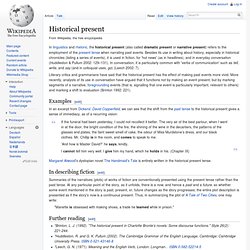
Besides its use in writing about history, especially in historical chronicles (listing a series of events), it is used in fiction, for 'hot news' (as in headlines), and in everyday conversation (Huddleston & Pullum 2002: 129–131). In conversation, it is particularly common with 'verbs of communication' such as tell, write, and say (and in colloquial uses, go) (Leech 2002: 7). Literary critics and grammarians have said that the historical present has the effect of making past events more vivid. More recently, analysts of its use in conversation have argued that it functions not by making an event present, but by marking segments of a narrative, foregrounding events (that is, signalling that one event is particularly important, relevant to others) and marking a shift to evaluation (Brinton 1992: 221).
*Brinton, L. Mystery Story / Narrative Tenses. [DOWNLOAD THIS EPISODE] [LISTEN TO PART 2] [FREE AUDIOBOOK OFFER]This podcast is about narrative tenses (past simple, past continuous & past perfect – see details below).
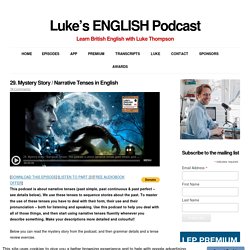
We use these tenses to sequence stories about the past. To master the use of these tenses you have to deal with their form, their use and their pronunciation – both for listening and speaking. Use this podcast to help you deal with all of those things, and then start using narrative tenses fluently whenever you describe something. Make your descriptions more detailed and colourful! Below you can read the mystery story from the podcast, and then grammar details and a tense review exercise. Listen to the story, and notice the different verb forms being used.
Subscribe to Luke’s English Podcast to improve your English every day, and have fun in the process! The mystery story:Last night I was walking home next to the river Thames, when something strange happened to me. How to Write a Past-tense Narrative. This Itch of Writing: Past and present tense. Since I wrote this post, I've blogged about Past and Present Tense in more detail, but this post explores some of my own decisions about it, in particular cases, in more detail, so it might still be useful.
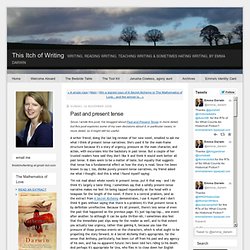
A writer friend, doing the last big revision of her new novel, emailed to ask me what I think of present tense narratives. She's used it for the main-frame structure because it's a story of urgency, pressure on the main character, and action, with excursions into the backstory in past tense. But a couple of her trusted readers have said they don't like it and think it would work better all past tense. It does seem to be a matter of taste, but equally that suggests that tense has a fundamental effect on how the story is read. How to use Past Tense, Present Tense and Future Tense in Novel Writing. I finished this Hub, confident that I'd covered how to use each of these tenses.
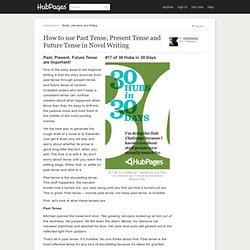
Certain that present tense wasn't used in novelwriting often enough to matter. It can work. Opinion: Philip Hensher. Why are so many novels being written in the present tense these days? Who's asking: Peter Johnson, London Elvis Costello sings it in "Brilliant Mistake": "I wish that I could write a book/And talk in the past and not the present tense...
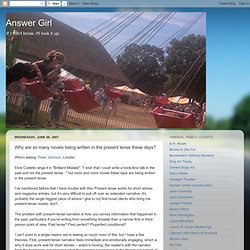
" but more and more novels these days are being written in the present tense. I've mentioned before that I have trouble with this. Present tense works for short stories and magazine articles, but it's very difficult to pull off over an extended narrative. It's probably the single biggest piece of advice I give to my first-novel clients who bring me present-tense novels: don't. The problem with present-tense narration is how you convey information that happened in the past, particularly if you're writing from something broader than a narrow first or third-person point of view. I can't point to a single reason we're seeing so much more of this, but I have a few theories. Writing Fiction: Present Tense, or Past? A reader emailed me today:I am writing fan fiction online and one of the people who edits my posts told me that books are written in the past tense.
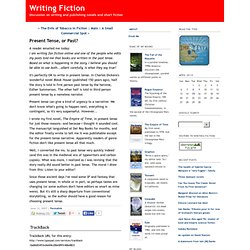
Based on what is happening in the story, I believe you should be able to use both...albeit carefully. Is what they say true? It's perfectly OK to write in present tense. In Charles Dickens's wonderful novel Bleak House (published 150 years ago), half the story is told in first person past tense by the heroine, Esther Summerson. The other half is told in third person present tense by a nameless narrator.
Present tense can give a kind of urgency to a narrative: We don't know what's going to happen next, everything is contingent, so it's very suspenseful. Why now, why then?: present-tense narration in contemporary British and commonwealth novels.(Critical essay) - Journal of Narrative Theory.